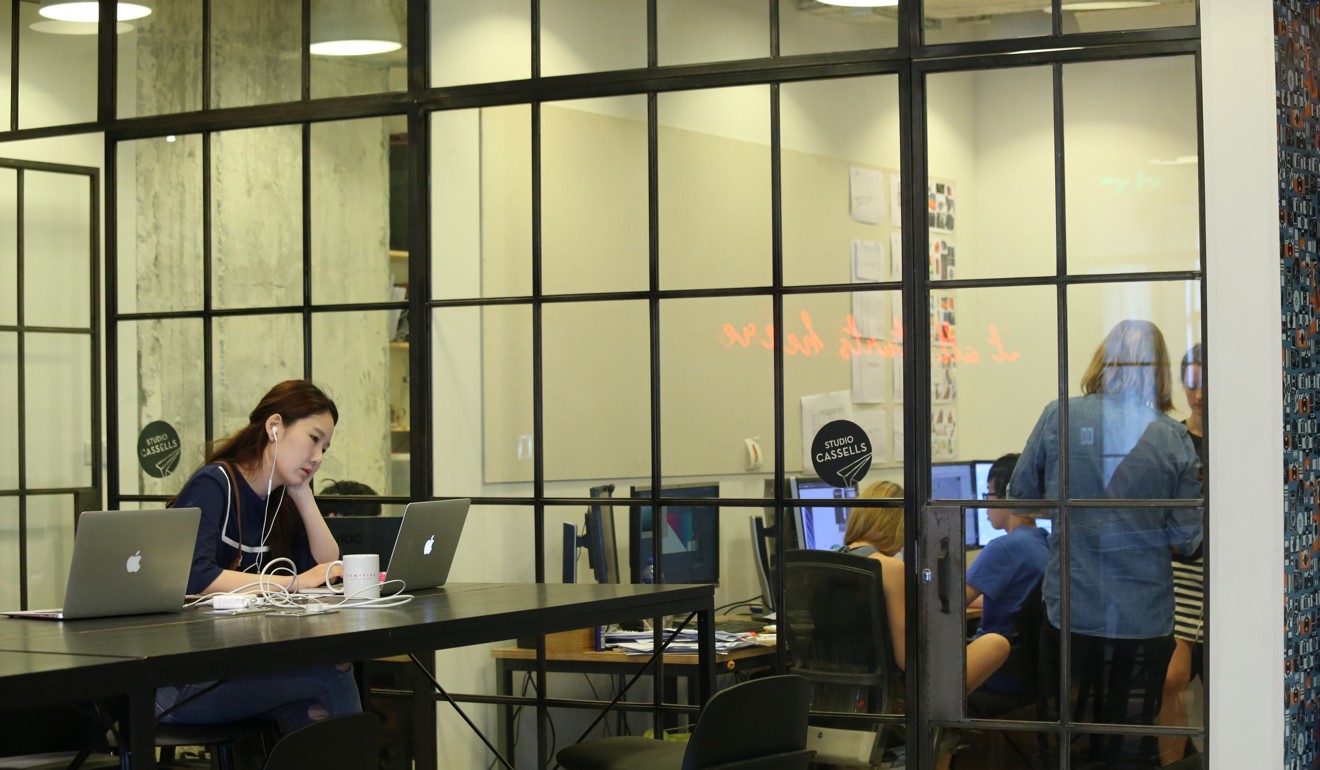
Single-industry co-working spaces in Hong Kong - first tech, now fashion - launched to help start-ups network
Co-working spaces have been around for a while, but Hong Kong company Campfire Collaborative Spaces believes its focus on industry-specific spaces offers users more opportunities to network and be inspired
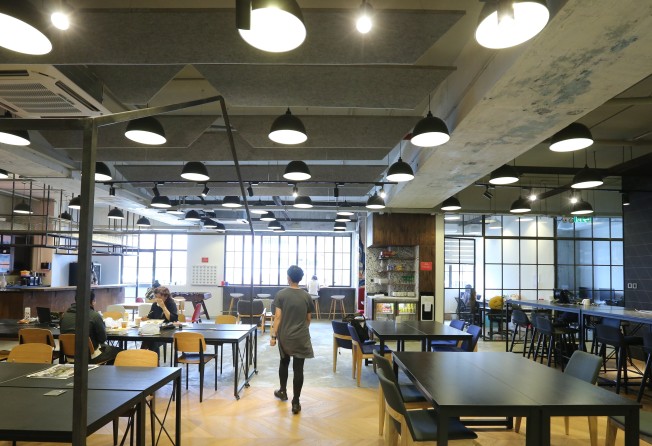
It’s Monday morning at Campfire Creative in Wong Chuk Hang, on the south side of Hong Kong Island, and there’s not a long face in sight. Nobody’s watching the clock, pining for the weekend, hoping the boss won’t catch them goofing off. Instead, sparks fly as start-up spirit and entrepreneurial energy ripple through the fashionably tricked out industrial space.
“Passion breeds productivity, and productivity creates an exciting atmosphere, a place where you feel inspired to work,” says Campfire co-founder and chairman Albert Fung.
Campfire Collaborative Spaces offers industry-focused co-working spaces, and Campfire Creative is its latest offering, targeting the fashion set. Private and shared office spaces, meeting rooms and chill-out zones sprawl across the fifth floor of the Remex Industrial Building, while a sewing room, photography studio, bar and lounge, and catwalk with seating make it a one-stop fashion shop. Up on the seventh floor, they’re busy kitting out their upcoming social media co-working site with a green-screen television studio, show kitchen and stage, and screening room for pilots and premieres.

“Real estate runs in our families,” says Australian-raised CEO Tse. “We’re second-generation property developers. We’ve always been passionate about property and we’re fascinated by tech. So when the opportunity arose to do property technology, we jumped on it. We began with a vision to help entrepreneurs and it’s developed into something much more than that.”
As the number of start-ups, entrepreneurs and freelancers increases, it seems more people than ever are working for themselves. Yet with high office rents, homes full of distractions, and cafes clichéd, today’s self-starters need a place to go. Co-working spaces provide the solution.
Campfire’s gambit is to create industry-oriented ecosystems – co-working communities for people in the same field.
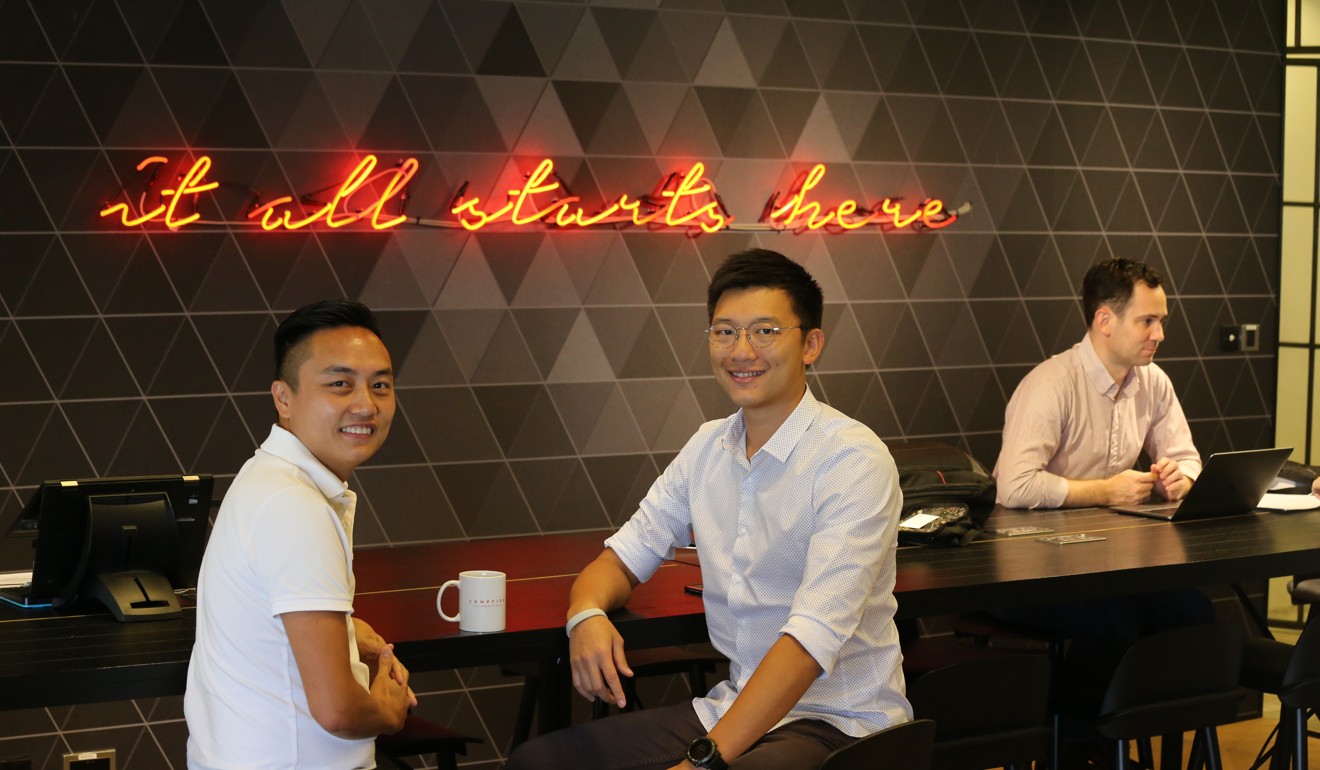
“We get to know our members and help them build links with each other,” says Tse.
We’re entrepreneurs in multiple industries, and we’ve always found we draw the most inspiration from people in the same fields
“We hold tailor-made events for our audience so that everyone has a reason to attend and network. And we facilitate introductions for suppliers, partners, distributors and clients, so that our members can run their businesses, scale their capabilities and even unwind without leaving the office.
“Our members add value to each other, and co-working enables them to save money so they can pursue a more balanced lifestyle and utilise their resources towards developing their business,” Tse says.
Campfire has struck a nerve, tapping into Hong Kong’s entrepreneurial spirit and channelling it through co-working spaces to foster knowledge-based communities – something more than the sum of its parts.
The idea for Campfire emerged shortly after the January 2016 riots in the city’s Mong Kok district sparked by attempts to shut down informal Lunar New Year hawker stalls.
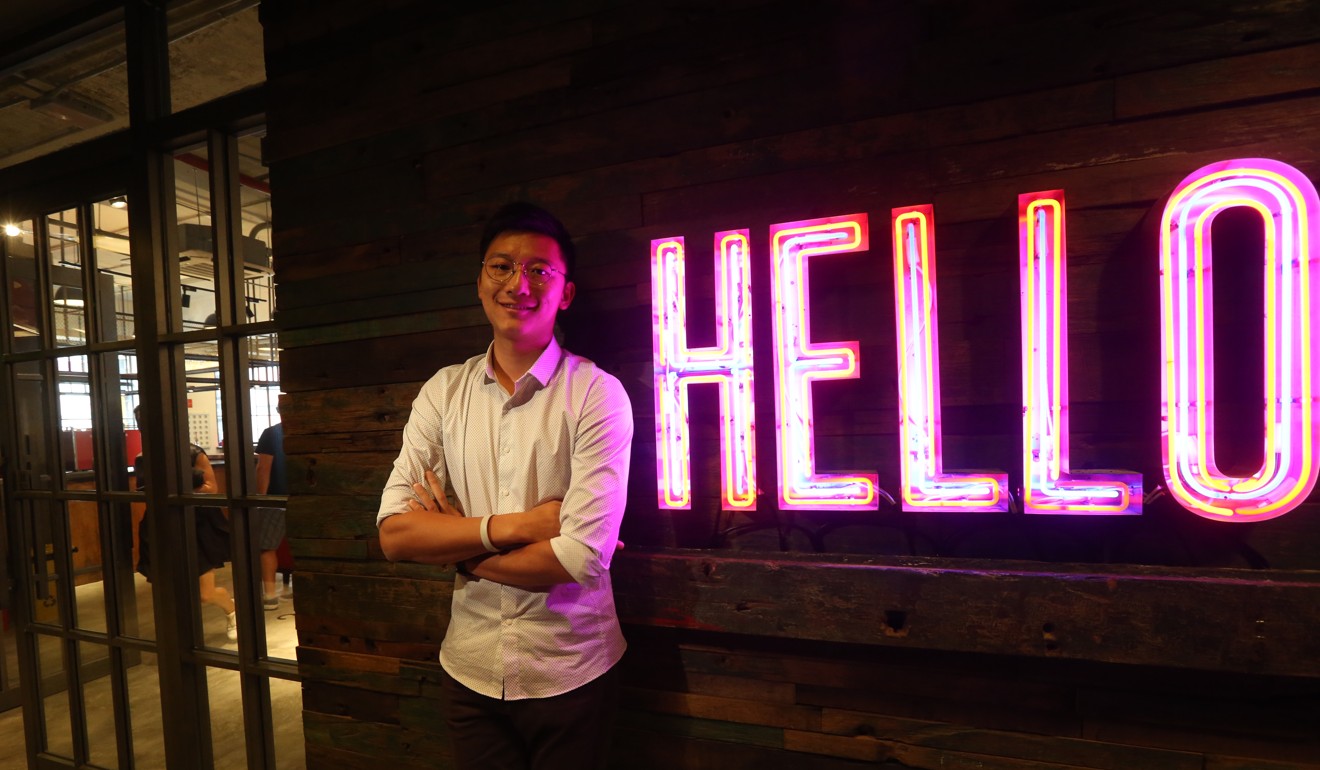
“We wanted to create a platform to support entrepreneurs,” Tse says. “We’ve started quite a few businesses in Hong Kong and we know how hard it is.” What followed was a four-month-long conversation about co-working space.
Campfire was born in April 2016 with a tech-focused site in an industrial building in Kennedy Town. The team opened Campfire Creative at the beginning of this year in Wong Chuk Hang. After raising US$6 million in May, they’re now courting investors daily and have nine or 10 more sites slated to open this year.
“Members get the hardware and software they need, such as a catwalk and fashion shows. The magic comes from our members’ success. We take pride in the connections we help them make,” Tse says.
The magic comes from our members’ success. We take pride in the connections we help them make
“When we started we didn’t have such a clear idea,” says Albert Fung. “We just thought to make a platform for entrepreneurs, so our design was pretty generic. But when we really looked at co-working and its potential, we realised it’s about the culture, and how it heightens collaboration. By being industry focused, we can maximise collaboration.”
While the site in Kennedy Town – a gentrifying neighbourhood at the western end of Hong Kong Island – which was organised around tech-based start-ups and entrepreneurs, proved the concept, Campfire Creative has fleshed it out by tapping into Wong Chuk Hang’s history as a garment district and summoning the zeitgeist of Hong Kong’s fashion start-ups and creative ventures. Now, fashion shows and talks happen almost every day.
“We hope we can do this with every local district we operate in,” says Tse. “When we look at a space, we study that district’s culture. Wong Chuk Hang was fashion-based so we made a creative fashion space.”
Events may be Campfire’s biggest draw. “They’re our bread and butter,” says Tse. “Whether large or small, we have about 20 to 30 events per site per month. They get people together and give them a chance to learn and experience different things within their industry.”
The team at Campfire sees limitless potential. Reports suggest the freelance economy could eventually become the core of the global workforce. And according to real estate services firm Colliers, by 2030, 30 per cent of all office space will be co-working.
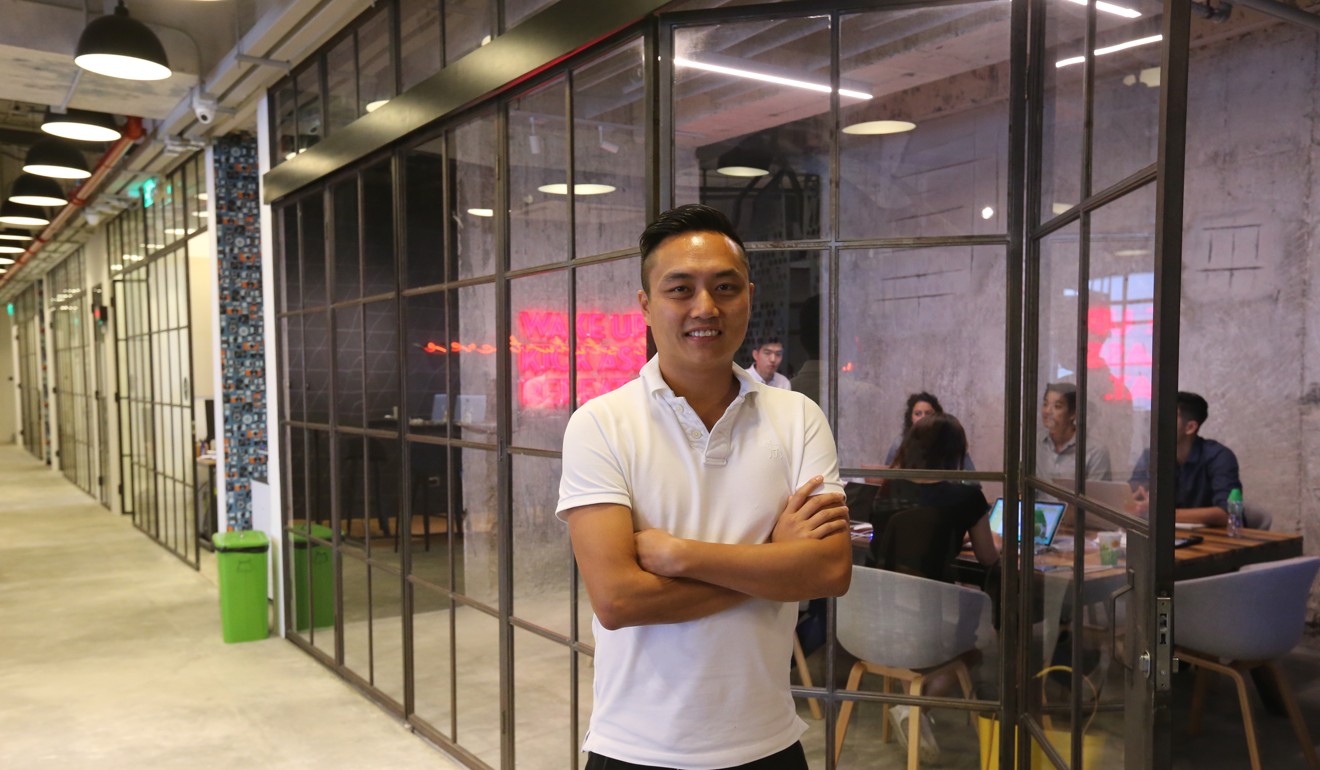
We’re getting into co-living, co-education, co-retail, co-industrial, who knows ... we want to push the limits of sharing economies and keep innovating
Further down the line, the vision encompasses more game-changing prospects. “By taking a holistic view of their portfolios, developers can link multiple properties in different geographic locations and give them synergy to strengthen their position and grow their value as a company.”
“By the end of the year,” Tse says, “we’ll have 11, possibly 12 sites; eight of them in Hong Kong, two or three in Australia, and one in London. And we’re looking into Singapore, Bangkok, Tokyo, Vietnam and many more.
“At heart, we’re a co-working space, but it’s our vision and our mission to become a network of shared spaces across Asia-Pacific in multiple sectors and industries,” Tse adds. “So, we’ll be industry-focused with our spaces. And beyond that, we’re getting into co-living, co-education, co-retail, co-industrial, who knows ... we want to push the limits of sharing economies and keep innovating.”
While pundits and punters are quick to bemoan Hong Kong’s limitations as one of the world’s most expensive cities, the team at Campfire sees limitless potential. “Hong Kong’s got so much opportunity,” says Fung. “Yes, residential rates are high, yes, office space is high, but there’s a reason for that. It’s growth, so tap that growth. Nobody hustles as hard as Hong Kong. That’s a real spirit we have here. And we’ve got to keep that going because that’s what built this place.”
Innovation is at the core of Campfire’s strategy. “We want to embrace change as much as we can, and see where we can take it,” says Tse. “All these things lead to a better, happier life.
“Campfire is like a magical journey. I’m proud of the energy, the connections made, seeing businesses collaborate, hearing their progress. It’s very rewarding. The magic comes from our members’ working together and succeeding..
“Just think of a campfire – it brings people together. It’s when conversation is at its peak, when our guard comes down, when we’re most accessible, most inclusive. At the end of the day, it’s all about togetherness.”